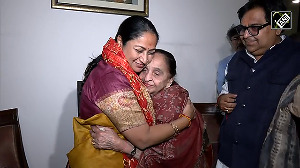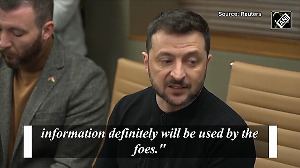However, his elder brother who runs a small shop of leather goods is not so lucky. He has not been able to access a bank loan for expanding his business. Both of them live in Dharavi, Asia's largest slum, in the heart of Mumbai. Only a handful of Dharavi's close to six lakh population has access to basic banking services, even though they live in the country's commercial capital, which boasts of hundreds of bank branches and ATMs. The story is not very different for the 8 million people who live in slums in Mumbai. Unlike their counterparts in rural India, they have access to schools, health centres, roads and post offices, but not to the basic banking services.
It's surprising but true that in Gujarat and Maharashtra, India's two most industrially developed states, only 60 out of every 100 adults have bank accounts. Of the entire population, only 34-35 per cent have bank accounts in these two states. The all-India average is 59 per cent of the adult population and 31 per cent of the entire population. This has been arrived following a simple arithmetic: the combination of savings and current accounts as a percentage of population.
Since a large chunk of the population normally maintains more than one bank account, the actual number of account holders could be far less. The financial coverage ratio in urban India (barring Chandigarh, Goa, Delhi and Punjab) is abysmal if one compares this with the developed world. For instance, between 92 and 94 per cent of the UK population has either current or savings accounts.
While a vast majority of population even in Mumbai does not have access to basic banking services like a savings account, a section of the customers have been pampered with credit cards, debit cards, consumer loans and an array of financial products. These customers suffer from fatigue, while others are systematically excluded by creating barriers such as requirement of high minimum balance in savings accounts and so on. Last year, two new private banks collected around Rs 100 crore each by imposing penalty on customers for not maintaining a minimum balance!
Indeed, private players are very aggressive on this front. They insist that the customers must keep a certain minimum balance in their savings accounts (between Rs 5,000 and Rs 10,000) because otherwise it is unviable for banks on account of the high transaction costs.
These banks enjoy the best of the both worlds - the deny banking services to a vast majority of population and increase their "other income" by imposing penalty on customers for violating certain norms or availing of certain services in excess. Unfortunately, all these happen in a non-transparent manner as rarely do banks spell out the "dos" and "don'ts" for their customers in an intelligible way. Which is why the RBI has directed banks to make available a basic banking "no-frills" account either with "nil" or very low minimum balances and keep charges reasonable enough so as to make such accounts accessible to vast sections of the population. The nature and number of transactions in such accounts could be restricted, but has to be made known to the customer in advance in a transparent manner. Globally, access to basic banking is fast becoming a movement, steered by state authorities and central banks. It's a statutory right to have a bank account in France. The Financial Inclusion Task Force in the UK has identified three areas for the purpose of financial inclusion - access to banking, access to affordable credit and access to free face-to-face money advice. A civil rights law - Community Reinvestment Act (CRA) - in the US prohibits discrimination by banks against low and moderate income neighbourhoods.
The State of New York Banking Department has also made it mandatory for each bank to offer a basic banking account where the initial deposit cannot exceed $25 and the minimum balance is only $0.10. It also says that at least eight free withdrawal transactions will be allowed in a cycle.
Of course, for banking to be genuinely available to everyone, even private banks will have to chip in. So far, they've restricted their operations to top cities. Even those that have their registered offices in small cities hardly have major operations there. While the RBI has directed banks to provide low-cost banking, it too needs to keep a strict vigil to ensure banks come up with such facilities and do their best to ensure India gets universal banking.







 © 2025
© 2025